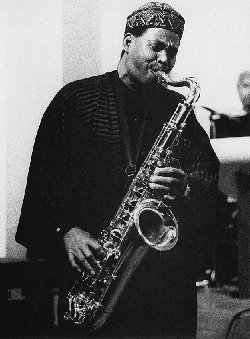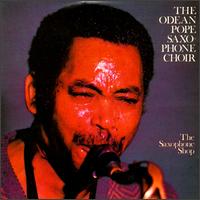

Courtesy of Odean Pope

Knitting Factory

Black Saint
A
FIRESIDE CHAT WITH ODEAN POPE
Odean Pope, like Joe Maneri and Joe McPhee, is a saxophonist that gets
such little mainstream attention that I am losing many hours of sleep.
Why Time hasn't done a cover or better yet, why Jazz Times has not done
a cover of any of these three giants is a mystery to me. A Odean cover
would sure beat some of the crappy covers that some of these rags have
had lately. If I can just convince one person to buy one Odean album through
this interview, well, then my work here is done folks. So to help me get
some much needed beauty rest, get on the bandwagon. As suave as I am,
the sucker's going to fill fast. I bring it to you, as always, unedited
and in his own words.
FRED JUNG: Let's start from the beginning.
ODEAN POPE: Basically, I from a little village in South Carolina called
Ninety Six, South Carolina, a little town called Ninety Six, South Carolina.
I started singing and speaking in the church. That's where the inspiration
came from. We moved to Philadelphia when I was around ten and from that
experience to the big Baptist church and a big Baptist choir, I was trying
to figure out what instrument I could find that could recapture some of
those things and fill bright moments that I had experienced in the Baptist
church. What I did was I started with the piano and played the piano for
a while and then I moved to the clarinet. Finally, when I picked the saxophone
up, I was divorced and I thought I could use it as an extension to reach
out to some of those beautiful times that I had in Baptist church.
FJ: How many people were in the town of Ninety Six, a title of an Enja
album of yours?
ODEAN POPE: Well, Fred, the population during that time was very small.
It would probably be, maybe, twenty-five thousand.
FJ: Did you take formal lessons?
ODEAN POPE: Yes, I took lessons. I studied here in Philadelphia for a
while with some private teachers and I also did some studying with Benny
Golson, Archie Shepp, and Max Roach. My formal training came through going
to, I did some studying with Kenny Clarke at the University of Paris.
When I went there a few times, I always would take lessons with him in
African rhythms. I studied for the saxophone and piano, I did some stuff
with the Berklee School of Music in Boston and also had a lot of private
teachers.
FJ: As a member of Max Roach's quartet, you have had an opportunity to
work with one of the most important drummers of the music.
ODEAN POPE: I met Max some years ago and Max has always been a great leader
and a great person to work with. He gave you a lot of freedom to play.
He also inspires you. Max is one of those people that, he likes individuality.
He stresses that all the time, that you should try to get your own voice
and you should try to work very hard towards that. He's an individual
as we all know. It was just a great honor to just sit down and talk and
exchange ideas and not only play. In addition to the playing, it was just
a great honor to just sit down and talk with him and get some ideas and
get some information. I would say that he was just a great person. To
me, it was like going to one of the highest institutions to be working
with him.
FJ: What is your fondest memory of your time with Max Roach?
ODEAN POPE: Yeah, let me just point out, Fred, that I was very blessed
and honored that shortly before Dizzy Gillespie passed, this was probably
around '88, somewhere down in there, they named a park in London after
Max Roach, the Max Roach Park. In London, England, there is a park there
called the Max Roach Park. So during that period, the Queen, she set up
a tour, a twelve-day tour with the Max Roach Quartet featuring Dizzy Gillespie.
That was the most rewarding time of, well, I've had some very, very bright
moments with Max, but that was really, really a bright moment. Traveling
with those two giants for pretty close to three weeks was again, like
so much information was revealed and all kinds of storied that he was
telling about Charlie Parker and just the olden days and how they used
to have to go and work and travel and just a combination of many, many
things. To me, that was one of the great, great highlights of the twenty
years that I've been with Max. Even though there have been some great,
great opportunities in terms of recording. I remember one time we recorded
in Italy with Lee Konitz and Tony Scott. It was Cecil Bridgewater, Tyrone
Brown, myself, and Max Roach. That was another great, great experience
to be in the studio with people like Lee Konitz and Tony Scott. For those
that are not familiar with Tony Scott, he was a guy that played with Billie
Holiday and a whole lot of other people. That was a wonderful experience.
There's been so many wonderful experiences working with Max. Like I said,
it has been like a learning, it's been like a school for me.
FJ: Let's touch on your '70s band Catalyst.
ODEAN POPE: We were all teaching in Philadelphia at a cultural center.
I was the band director at the cultural center. I was able to get Tyrone
Brown and Sherman Ferguson and Eddie Green jobs there. So we were all
working there at the art center. We worked there for about six years all
told. It was very good. The opportunity was very good. We were working
four hours a day and we had keys to the place. It was a huge building.
They had all kinds of pianos and all kinds of recreation there for us
to open up, practice, and write. We spent a lot of time developing, writing,
and rehearsing. That's when we formed the group, when we were working
there. We recorded for, during that time it was Joe Fields' Muse. Since
then, Joel Dorn, he bought that out.
FJ: Dorn's 32 Jazz just re-released the record.
ODEAN POPE: That's right. They just reissued it. That was a great, great
opportunity for that group because we were close. We were like a family
since we had all worked together and spent a lot of time together. We
were all writing and trying to really develop our concepts and improvisational
skills and just the whole bit. We got a chance to do four recordings from
that experience. I thought it was very educational, not only for the four
of us, but for some of the people that were in the art center.
FJ: How did the Saxophone Choir come about?
ODEAN POPE: Speaking of the Saxophone Choir, Fred, that all comes from
the big Baptist church. Before I came to Philadelphia, it was must that
you had to go to church every Sunday in the South. There were the big
gospel choirs and singing. My mother was a school teacher and in addition
to that, she worked with the choir and rehearsed the choir and I was a
part of it. I had to speak and sing. When I came to Philadelphia, I was
looking for that voice that could duplicate what I heard in the big Baptist
church. I started thinking and said, "Well, look, since I'm playing saxophone,
why not a saxophone choir?" The Saxophone Choir started back in the late
'70s. As a matter of fact, we just came back from Portugal. We did an
incredible concert over there. We played their festival on the last night.
It was greatest time that the Saxophone Choir played. It was a big, sold-out
house and the people were just overwhelmed with it.
FJ: Who is in the Saxophone Choir now?
ODEAN POPE: Billy Harper went over there with us. Most of the people are
from Philadelphia. It's Julian Pressley on alto, Sam Reed on alto, Robert
Landham on alto, on tenor, of course, I'm playing first tenor, Bob Howell,
and of course, Eddie Green, Tyrone Brown, and Craig McIver are the rhythm
section.
FJ: Tyrone has been a frequent contributor on your recordings.
ODEAN POPE: I haven't heard any Tyrones out there. Tyrone is a phenomenon,
I think. In addition to being an excellent reader, he's an excellent writer,
composer, and as far as playing ensemble and improvisation, he's just
well balanced. He can do it all. When I'm not able to use him, I really
miss that because he's the foundation. He plays such great foundation.
He's such a great musician. I just really miss him when he's not there.
FJ: You were a player during the edifying loft scene in New York, a grievously
under appreciated period.
ODEAN POPE: I used to go to New York and listen to guys and hang out with
Lee Morgan. I used to be up there with Benny Golson, Jimmy Heath, Max
Roach, Trane. It was like a great opportunity again, to have so many musicians
from Philadelphia. It is strange, for example, when I am in Europe and
I run into musicians, it seems like the relationship is much better, when
you are on the road. It is the same type of thing. When I went to New
York, it seemed like everybody treated you very royally. We had a good
time with exchanging ideas and there was time to develop the music and
talk about the music and play. There was a great area where they had lofts
in New York, where I would just go up and play and hang out with the guys.
There was a lot of information passed down to me during that time.
FJ: What was the vibe during that time?
ODEAN POPE: To me, it was very, very inspiring, in terms of just being
able to see all the wonderful things that were happening around me, as
well as being involved with some of those things that were happening and
to be a part of it, it just made it much more inspiring for me because
during that period all the musicians like Bobby Timmons and Lee Morgan.
This was before the '70s. This was probably in the '60s, late '60s. I
think that was a great period. It's too bad that they don't have the same
thing happening now. Some of the areas of the world, even New York and
Philadelphia, still have that happening to some degree. But during that
period, I just felt it was happening every place. They had lofts, and
every night, every day, you had some place to go and exchange ideas and
get information and play. I think it was a great, great period and I wish
it would happen again. That's why there were so many great musicians during
that period. The musicians used to get together and exchange ideas and
play and practice, practice and play, and practice, practice, and play.
The economy at this time prevents the musicians from doing that at this
point. I am so grateful that I was a part of that period.
FJ: Let's touch on your Enja recording, Ninety-Six.
ODEAN POPE: Well, you know, Fred, it goes way, way back. Mickey Roker,
Tyrone, and I have known each other for many, many years. We're all from
Philadelphia and when we crossed paths, we always addressed each other
by saying, "Look, we've got to do something together. We've got to work
together." There was a place called Riffs, where all of the musicians
like Reggie Workman, Jimmy Garrison, Bobby Timmons, and Lee Morgan used
to go. We used to go every Monday night and have a session. Mickey goes
way back and every time we would meet, we would talk about hooking. I
got an opportunity to do a date with Sunny Murray and the producer really
liked my playing and he liked what I was doing. He said he had heard about
my trio and he would like to do a trio date. So I thought it would be
idealistic to use Tyrone Brown and Mickey Roker on that particular date.
We worked many, many weeks and months on this date. We used to get together
and just rehearse and rehearse. That was one of the few dates that I think
every tune on there I somewhat can say is not bad because we worked so
hard towards that date. Often times when I record, I might like one or
two of the pieces on the date and the other two are just somewhat mediocre.
On this particular date, I can say that I thought everything on there
was passable. I know it can always be much better, but I thought it was
passable because we put so much time into it. I thought Mickey and Tyrone
did a wonderful job on the date.
FJ: And your new Knitting Factory Records date, Ebioto?
ODEAN POPE: Now, that is a great date. Have you heard that, Fred?
FJ: I have.
ODEAN POPE: The Knitting Factory job was with Tyrone and Craig. Craig
is my regular drummer. Again, Craig is one of those kinds of drummers
that he plays all of the percussion family. He's a very thorough drummer.
He plays with the trio in addition to the Saxophone Choir. He's playing
to me, is very, very supportive to what I'm trying to do. He's very flexible,
and in addition to being a great drummer, he's just a great person to
be on the road with. Traveling with Tyrone and Craig, it's like a big
family. We all try to help one another.
FJ: Let's talk about your latest CIMP release, Changes & Chances with
Dave Burrell.
ODEAN POPE: That was recorded back in January of last year, '99. Dave
and I, we got together and we put some things together. Sometimes you
do things and some work out and some don't work out. But I am really never
satisfied with none of my work, so I am constantly working to try and
update and better the things that I do.
FJ: The mark of a consummate musician.
ODEAN POPE: Everyday, if not able to practice or write, I just feel as
though I am losing something. So I try to practice or do something towards
the art. I think that's what my duty was here on planet Earth.
FJ: And the future?
ODEAN POPE: The future looks very bright because I have a class two days
a week when I am in town in Philadelphia that has some great, great young
musicians. I have something called Collective Voices with Tyrone Brown
and Dave Burrell and I also use two tap dancers, as well as some of my
students. The young musicians range from fourteen, there's a little girl
who is fourteen and she plays the flute like you've never heard before.
There is another little girl who is sixteen and she plays the alto and
she can read anything you put in front of her and she is really making
great progress. As a matter of fact, I just worked with them last night.
I think the future is very, very bright. Of course, so many young people
out there are really, really dedicated towards keeping the music alive.
I think it is even going to get better. A lot of young musicians are getting
involved with not only the basic concepts and taking stuff from what Trane
and all the other people have done over the years, but they are trying
to really develop their own voice. I think, like I said, you will see
some great young musicians coming out.
Fred Jung is Editor-In-Chief and can't believe they made a Jurassic Park
III, as if the first two weren't enough. Comments? Email
him.